January 6, 2013
PLEASE TAKE ACTION:
DO NOT ALLOW VULTURES TO BE KILLED IN LEESBURG
Loudoun is home to Turkey and Black Vultures. While both species are protected under the Migratory Bird Treaty Act, the USDA’s Wildlife Services may under special circumstances take action against them, including killing them.
This winter, a large number of vultures (some reports say 150-200) are roosting along a 4-house area along Mayfair Drive NE and Plaza Drive NE in Leesburg.
Due to resident complaints, the Leesburg Police contacted the USDA to drive the vultures from neighborhood trees. Starting Monday, USDA will use pyrotechnics and lasers to try to scare the birds away. If pyrotechnics do not work, the USDA will kill vultures and hang their bodies from trees. Killing and hanging birds is not only barbaric but also ineffective. It must not be allowed.
We understand that people living in this neighborhood are unhappy with the presence of the vultures. Therefore, we request that the Town of Leesburg ONLY allow USDA to try to displace the birds by non-lethal means. We also request that lasers not be used as lasers shined into the eyes of birds and other wildlife can blind them.
Vultures are a critical part of our ecosystem and while their numbers swell in winter, they will decline again as non-resident birds migrate north and flocks disperse. We welcome the opportunity to help the community build an understanding of vultures and the critical roles they play in our ecosystem. It also should be recognized that many communities actually celebrate vultures.
Please show your support for wildlife and the need for people to be tolerant of other species by emailing Lieutenant Jeffrey Dubé and the Leesburg Town Council (council@leesburgva.gov). Ask that only non-lethal measures be used to disperse the birds (including no use of lasers which can cause physical injury).
Vulture Facts
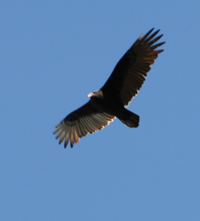
1) The number of vultures will drop naturally due to migration and seasonal dispersion. While we do have populations of Black and Turkey Vultures that reside in our area year-round, our winter populations swell because of the ebb and flow of natural migratory bird activities. By February, non-resident vultures will begin to migrate north to reach their summer habitats and winter flocking behavior of local vultures will subside.
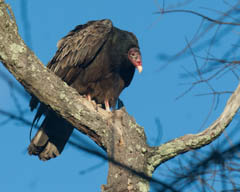
2) Vultures play a valuable role as scavengers in our ecosystem. Vultures play a significant public health role as they are “Nature’s cleaners,” removing road kill and other dead animals that otherwise would rot and spread disease as they decay. Loudoun has a healthy deer population and there are numerous dead deer that are either dumped or hit along our roads. Vultures winter here because the food source is sufficient to support them. We need the vultures to clean up the roads.
We know of no cases of people contracting disease from vulture excrement but there are numerous examples of disease resulting from dead animals in streams and other places where vultures have not eaten the carcasses. In fact, a true public health concern would result from an absence of vultures as has occurred in other parts of the world.
3) Displacement of the birds from the current location could have greater negative effects on neighborhoods. With continued clear cutting of trees, the vultures are loosing historic roosting places in the woods. They do habituate to human areas and often use structures such as water tanks, barns, cell towers and other man-made structures as replacements for trees. It is well documented that efforts to displace vultures from one location often results in their moving only short distances. The nearest next-best location could be roof tops of other neighborhoods. Leaving the birds to roost in trees is the best solution
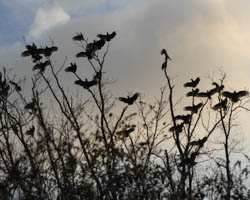
4) Vultures are not dangerous and their excrement does not pose a public health threat; they are of no risk to people or pets. Their excrement contains uric acid which actually kills bacteria. Excrement is washed away with rains. Vultures do not harm pets or children. Their feet are not designed for grabbing, only for standing.
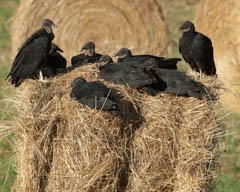
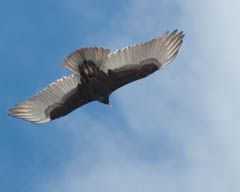
5) Impact on our children of killing and hanging a bird is significant. Hanging a dead bird in a tree to drive other birds away teaches that we do not value life or diversity. It teaches that if we are inconvenienced or don’t like how something looks that it’s okay to kill and it’s okay to drive away a species. It does not teach our children respect for others. It does not teach respect for our environment or the creatures with which we share this planet. We should be teaching acceptance and tolerance. We should be teaching our children about the lifecycles and importance of these birds, not reinforcing myths, promoting false information and reinforcing fear.

